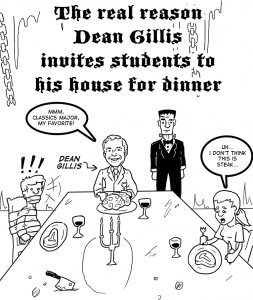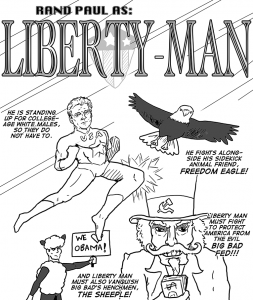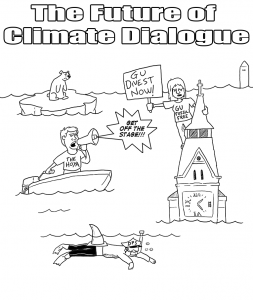She gets in the car, closing the door behind her. He can only make out her hair surrounding her face so he reaches up to turn on the car light. The light flashes on, all the windows darken to black, and the world outside ceases to exist, and he sees her, her cheeks damp, wearing the same pajama pants as the time before, her eyes as begging and beautiful as ever, a gaze that searches for the sympathy she knows he can give, and he thinks it was a stupid idea.
“We’ve done this before, Lauren,” he says. “We’ve done this before knowing that we’ve done it before, and knowing that didn’t mean a thing. We couldn’t avoid making the same mistakes. It never worked.”
Her head falls into her hands.
“Turn off the light,” she cries, softly, like someone would whisper goodbye when they didn’t want to leave.
“I’ll go back in. It’s fine,” she says, trying to slow her breathing.
A moment passes.
He starts the car, the interior lights now off, and starts into the hills behind her house.
“Thanks,” she says, wiping her eyes then looking at her fingers, absent-mindedly in the dark, as if to make sure she was crying.
Eucalyptus and oak trees blot out most of the night sky. The moon set hours ago. He watched it from a rooftop, smoking a cigarette and regretting he didn’t see his friends more this summer. He knew she was still in town—he keeps a tab on her, where she is, if he can, because he can’t help it—but didn’t know that she watched the moon set out her window after she had hung up the phone having heard that her boyfriend was now her ex-boyfriend. He doesn’t know it, that is the fact, but he’s guessed at it.
She reaches towards the radio, turns it on and changes it to a pop station.
“Change it,” he says, mildly irritated but paying attention to the road.
She thinks for a moment, comprehending her situation, and recognizes it as familiar.
“No,” she teases.
“Come on,” he replies, eyes ahead. “You know I don’t like this stuff.”
“No,” she says, again.
He lifts his eyes off the road, sees her smile, then recognizes the situation himself, and laughs.
“You know the rules,” he says, laughing lightly still. “My car, my music.”
He smiles at her, and she smiles back.
“You’re going the wrong way,” she says.
“You’re not showing me. It’s your spot.”
“It’s not my spot.”
“Well, do you think anybody else has ever gone there?” he questions.
“Maybe nobody, but nobody besides us,” she says. “It’s our spot, not my spot.”
“You’re the only one that thinks of it that way,” he says, and smiles.
She smiles back.
They always used to tease each other like that, and being able to do it after a year and a summer without it warms him against the mild cold of the last days of August. He looks back on those 15 odd months and finds them dull.
“Well, either way, you’re still not going there,” she says. “Turn right here, it will swing back around.”
“These roads don’t make sense,” he says. “They’re stupid.”
“Don’t fear something just because you don’t understand it,” she says. “Isn’t that what you used to say?”
Pretending to bristle, he says, “That doesn’t apply here.”
“You’re angry,” she says.
She laughs then says, “Turn right again here. This is it.”
He turns the car to the right and enters a small cul-de-sac. There is one house that occupies the left side against the hill and another on the right that descends down the hill, near the mouth of the cul-de-sac, but the far right edge is blissfully vacant, and Oakland sparkles in the distance, seeming to float like docks on the bay.
He turns the engine off, leaving the radio on but turned down. With the car quiet and the radio only an echo, they can almost hear the collective breath of the whole Bay Area, sleeping quietly and cherishing the last few nights when windows can be left open from dusk till dawn. A new song comes on the radio and the singer sings of pictures in his head.
“Do you remember this song?” he asks.
She hesitates.
“Come on,” he says.
“Vaguely.”
Her voice trails off.
“I showed it to you, remember?”
“Oh yeah,” she says. “I remember.”
She mouths the words softly and remembers more than she thought she would.
They talk about college, and summer, the random times that they saw each other, at a mutual friend’s house, a concert. They agree that college is great, but, you know, not that great. And when he asks her if she’s read any books recently, she tells him that he’s the only person who got her to read. She asks him, playfully, seeing if she can talk to him about it, how many girls want to go out with him at school, and he tells her, seriously, that there aren’t any, and she knows what he wants to say about how it’s been since her. Trying to keep the conversation from crumbling towards the past, she calls him a liar, playfully again, a compliment in context, and he takes a serious, abstract offense, pushes past her compliment and asks the question that has been on his lips since she called him, an hour ago. It was on his lips when he turned on the light in the car and saw the slight wrinkles next to her eyes that bend when she smiles and the same brown hair in the dark, the same question that had been on his mind since a friend mentioned to him offhand that she was having problems with her boyfriend and he pretended not to care.
She’s says that she doesn’t want to talk about it and he takes more offense, asking her why she called him if she didn’t want to talk about it. She says she doesn’t know.
“This is just the same,” he says. “You just call me to pick you up when another guy dumps you.”
“I know. I knew,” she says. “But you knew, too, and you still came. You said it yourself—it never works. And you still came.”
“You knew I couldn’t not come,” he says.
“That’s why I had to call. You know that. You—you make me feel good about myself.”
“You just”—he pauses—“take advantage of me,” he says, shaking his head.
“I know,” she says. “I know I do. Take me home.”
She is looking out towards the bay and he looks at her and sees the tears forming again, her face outlined by the faint city lights that tremble in the distance.
“But I don’t want to,” he says. “You know I don’t want to.”
“But you have to,” she says.
A moment passes.
“You know you have to.”
He clenches his teeth, disappointed, accepting, and starts the car.
He knows how to get back to her house. He has driven to the cul-de-sac by himself. He glides to a stop outside. She breathes heavily and opens the door without looking at him.
“I’m sorry,” she says, “but thank you.”
She walks towards her house and he apologizes after her, but the words, cognizant of their purposelessness, flutter and dissipate into the air, carried over the bay towards Oakland by the late summer breeze.
Her cheeks glisten as he watches her, the solitary light by her gate reflecting off her tears and into his eyes, and he remembers the night he drove her home because she was crying over another guy she went out with, whom she saw kissing another girl, a guy who he told her didn’t like her as much he did, and he wishes once again that he had kissed before she walked through that door.
He reaches into his pocket, pulls out the cigarettes—he bought them on the way over for just this reason—and their receipt, finds a pen in the glove compartment, and writes on the back of the receipt, ‘The past is what took the hope away, and it’s the only thing that can give it back.’
From his other pocket, he draws a lighter and lights one as August collapses around him.
Moments Late in August
April 2, 2009
Read More
Subscribe
Login
0 Comments
Oldest





